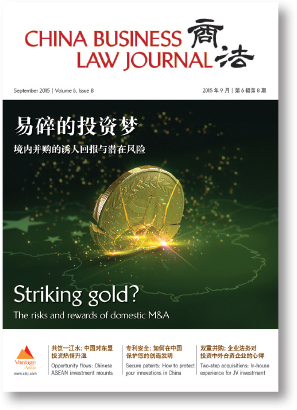The growth slowdown and stock market slump may breed doubt over China’s economic prospects, but disappointment as yet appears unpractical. China is actively pushing to tackle the current adversity through efforts such as the encouraging of inbound and outbound M&A, and these are showing positive effect.
 Striking gold? explores domestic M&A as China has issued new rules to facilitate mergers and restructurings. These aim to improve the structure and competitiveness of the economy by easing effort required for strong market participants to play a more influential role. Regulators have eased their grip on investments by foreign parties, reducing restrictions on foreign exchange and making indications that they will further simplify the regulatory regime.
Striking gold? explores domestic M&A as China has issued new rules to facilitate mergers and restructurings. These aim to improve the structure and competitiveness of the economy by easing effort required for strong market participants to play a more influential role. Regulators have eased their grip on investments by foreign parties, reducing restrictions on foreign exchange and making indications that they will further simplify the regulatory regime.
Yet challenges remain. The new stipulations for national security reviews are broad and vaguely defined, leaving much uncertainty. Pressure is also building for domestic and foreign investors to face increasing antitrust enforcement. Further issues may affect a merger’s success, e.g. cultural differences, labour troubles, or insufficient understanding of the target market, that can result in hard efforts being for naught – a wise integration plan is thus crucial.
The tough home market is also driving domestic companies to seek fortunes abroad. Opportunity flows looks at Chinese investment into the countries of ASEAN, the world’s sixth largest economy. Territorial disputes have not extinguished commercial enthusiasm – China is now the region’s largest trading partner and is on track to become one of its major investors.
There are, however, stumbling blocks that investors must be aware of, including communications issues, restrictions on foreign ownership and investment options and the potential for land acquisitions to be met with resistance from local villagers. For those interested in avoiding pitfalls in their search for ASEAN gems, this feature is a must-read.
Two-step acquisitions shares a Chinese in-house counsel’s view on practical strategic issues that can arise when a foreign investor acquires the foreign shareholding of a Sino-foreign equity joint venture. The investor may at times find it necessary to acquire the Chinese partner’s real estate assets leased by the target joint venture. The best approach, the counsel argues, is obtaining a contribution of real estate via increased capital into the joint venture, with the foreign shareholder contributing cash or other assets proportional to its shareholding in kind.
The present volatility of the stock market may result in a large number of securities disputes in the near future. Settling these disputes properly and efficiently lends a big hand to enforcing economic and social stability. New approach for securities disputes shares recent innovative methods to secure a sound resolution in Shenzhen. One such innovation is a resolution model integrating professional mediation, commercial arbitration, professional self-discipline and administrative regulation. This model is recognized as a major development in resolving capital market disputes.



























